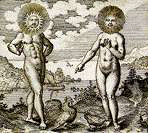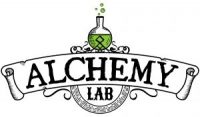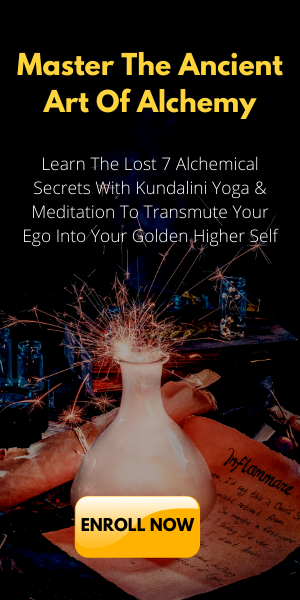What Is Alchemy?
Alchemy Is a Craft

The processes of alchemy are responsible for all of creation.
The goal of alchemy was simply hastened perfection, inner and outer, the divinization of matter and man. This idea is certainly not strange to any craftsman. “When a man undertakes to create something,” wrote Paracelsus, “he establishes a new heaven, as it were, and from it the work that he desires to create flows into him.” In order that it may be expressed, that it may resound, the Word must be made flesh; immortality must be incarnated outwardly in gold and inwardly in the development of a subtle body within this ordinary body: the “glorious body” or “diamond body” of oriental tradition, the “spiritual body ” of the Christian.
This “becoming” is what alchemy is about. Its process can also be expressed by the traditional formulas of initiation: the suffering, death, and resurrection of the god or the neophyte, represented by the substances in the crucible or by the material of the craftsman — the symbolic formula of transformation. Whether raw material, base metal, divine or human spirit, there must be the suffering of purification and separation. The patience that is the quality more vital to the craftsman is, in the final analysis, no other than this suffering, as it applies to the process of creation operating in and upon the artisan himself (Latin patiens from pati, to suffer).
And as the alchemical substance is “punished,” so is the craftsman’s material: clay is pounded; flax beaten; wool teased, carded, and twisted; metal softened and struck. The substance, whether material or human, must change its character, be torn into separate elements in order to be reformed into something other — it must “die” in order to be reborn.
And here we come to the central tenet of alchemy: its chief absurdity, proof (some would say) that in its operational sense at least it was all superstition and quackery; the idea that matter is alive. Yet, strangely enough, this is something that all craftsmen know to be true. They know that their material has a life of its own, a history, a character, needs, and possibilities unlike any other. They know that they must feel and understand this life so that a relationship can appear between it and their own. They accept a pattern for their work that is not theirs, that comes to them, as it were, from Above; but their work is not merely to obey and to imitate, not even only to “speed the process of nature,” but to bring something peculiarly their own, some element of themselves, to unite with that other living entity, the material between their hands. Otherwise the relation does not exist; the material is indeed dead, and they themselves no more than copyists. The gold of the alchemists was not the same as natural gold; it was “living” god. The craftsman added something even to the noblest of metals by his active relation with it.
The craftsman, as well as the alchemist, knows that his central task is the creation of himself; and it is above all for this aim that he strives with endless patience — as it is said in the Emerald Tablet of Trismegistus, separating “the subtle from the gross, softly and with great care” to make what his hands touch turn to gold.
Alchemy Is a Science

The Emerald Tablet says “Its father is the Sun, its mother the Moon.” Spirit and Soul, masculine and feminine, active and passive, light and darkness, all come together as One in creation.
Alchemy is a Science of Soul that results from an understanding of God, Nature, and Man. A perfect knowledge of any of one them cannot be obtained without the knowledge of the other two, for these three are one and inseparable. Alchemy is not merely an intellectual but a spiritual science, because that which belongs to the spirit can only be spiritually known. Nevertheless, it is also a science dealing with material things, for spirit and matter are only two opposite manifestations or poles of the eternal One.
Alchemy in its more material aspect teaches how minerals, metals, plants, animals, and men may be generated or made to grow from their “seeds.” In other words, how that generation, which is accomplished during long periods of time in the due course of the action of evolution and natural law, may be accomplished in a comparatively short time, if these natural laws are guided and supplied with the proper material by the spiritual knowledge of man. There is no doubt that gold can be made to grow by alchemical means, though it requires an alchemist to make the experiment succeed, and he who is attracted by the material power of gold will not obtain possession of the spiritual power necessary to practice the art.
It is therefore a grave mistake to confuse alchemy with chemistry. Modern chemistry is an artificial science that deals only with the external forms in which the elements of matter are manifesting themselves. It never produces anything truly new to creation; it can only recombine atoms and molecules into different substances. We may mix and compound and decompose chemical bodies an unlimited number of times and cause them to appear in various different forms, but at the end, we will have no augmentation of the underlying substances nor anything more than the recombinations of the substances that have been employed at the beginning. Alchemy does not mix or compound anything; it causes that which already pre-exists in a latent state to become active and grow. Alchemy is, therefore, more comparable to biology than to chemistry; and, in fact, the growth of a plant, a tree, oran animal or the evolution of whole species are alchemical processes going on in the laboratory of nature, and performed by the Great Alchemist — the power of the divine Mind acting in nature.
Alchemy Is an Art

Evolution is an alchemical process
Alchemy is also an art, and as every art requires an artist to exercise it, likewise this divine science and art can be practiced only by those who are in possession of the divine power necessary for that purpose. It is true that the external manipulations required for the production of certain alchemical preparations may, like an ordinary chemical process, be taught to anybody capable of reasoning. However, the results that such a person would accomplish would be without life, for only he in whom the true life has awakened can awaken it from its sleep in matter and cause visible forms to grow from the primordial Chaos of nature.
Alchemy in its highest aspect deals with the spiritual regeneration of man and teaches how a god may be made out of a human being or, to express it more correctly, how to establish the conditions necessary for the development of divine powers in man, so that a human being may became a god by the power of God in the same sense that a seed becomes a plant by the aid of the Four Elements and the action of the invisible Fifth Element (the Quintessence or Life Force).




